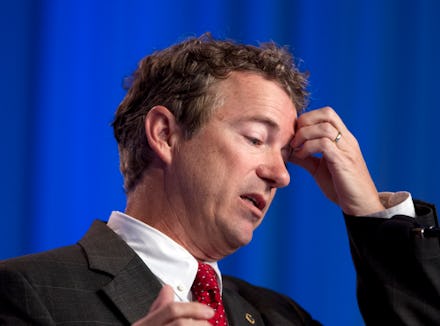Rand Paul Shouldn't Fight Obama's So-Called "War On Coal"

Senator Rand Paul (R-Ky.) is in hot water over allegations of plagiarism, but he should be feeling sweating just as much over his opposition to the latest coal regulations. Calling the recent push by the Obama administration part of the "War on Coal," the senator is adamant about making this a talking point for the coming midterm elections.
Paul has been very active on the environmental front, and not in a good way. While Paul at a speech at Howard University made the point that Republicans need to demonstrate that they too care about the environment, he is personally doing a rotten job of it. This is disappointing, as the self-described libertarian, in his fight against environmental regulation, is being a hypocrite. You see, Paul and other libertarians should be to the left on pollution issues, since they strike at the heart of what libertarians put the greatest value on and have the most resentment for: freedom and coercion.
To understand why libertarians like Paul should be embracing environmental regulation, we have to get to the heart of libertarian philosophy. Libertarians claim each person owns their time. Any demands by society that are forced upon the individual is a form of immoral coercion. This usually takes the form of resistance to taxes and policing. Seizing property is also considered coercion. Libertarians, if they favor a government at all, favor a minimalist form that protects individuals and property from harm. You'd be hard-pressed to find a libertarian who thinks murder, assault, and theft should be legal. So what does this mean for environmental issues such as pollution?
Air pollution, such as the smog this woman has been enveloped in, is an issue libertarians should be concerned about.
Pollution is in and of itself a form of coercion. It violates the personal sovereignty of those it impacts. While sources of pollution vary from toxic waste dumping to acid rain, when a pollutant has a negative impact on health, it is coercion. It would be a challenge for libertarians to explain how the moral implications from the outcomes of someone knowingly dumping a toxic substance into drinking water that they are aware may kill someone or destroy property from direct murder or destruction of property are different.
When an incident such as the BP oil spill (which was largely the result of companies cutting corners and a lack of regulatory oversight) occurs, massive destruction of ecosystems and property results (the fishing industry was decimated). Air pollution from coal is one of the easiest examples, with coal-fired power plants having well-known public health impacts. Environmental regulations will force some companies to evaluate and modify their business practices. Regulation might be a dirty word to most libertarians, but it's better to have a few dirty words than dirty drinking water, which unjustly robs people of their time, health, property, money, and in terrible cases their lives.
The BP oil spill wreaked havoc on the fishing industry in the Gulf of Mexico. Photo Credit: CNN
Nonetheless, there is a trend amongst many libertarian intellectuals and politicians towards denial that a problem even exists. Worse, many Libertarian think tanks such as the Heartland Institute has become intellectuals-for-hire by dirty industry. This undercuts the intellectual credibility of the political movement. Industry titans such as the Koch brothers inevitably embrace libertarianism due to its anti-government bent, but they have little desire to use libertarians as anything but a political tool to reach practical ends. Inevitably, to protect property rights and personal sovereignty, a public entity (government) has to step in to observe and protect the natural resources of society. Pollution often does not have a price connected to it in the contracts made between users and producers, and the negative externalities of those agreements infringe on the property rights of others. Thus it's essential to support government entities such as the EPA to impose solutions that limit the erosion of personal sovereignty that occur from polluting agreements.
Rand Paul and true libertarians have a choice to make. Libertarians tend to place a very high value on reason. The full weight of science stands against the denial of the impacts of pollution, which renders deniers ridiculous and discredits them intellectually. Should they recognize the gravity and implications of these issues, they must weigh which is the more dangerous form of coercion: the one that reduces their options in the free market, or the one that eventually destroys it.